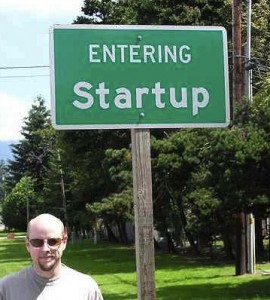So you have a few dollars of angel money or venture capital. Your product just won a startup competition. Users actually seem to be digging it. You might even have a business model. Life is gooooood. Except for one thing...
Now you have to build your team.
This is one of those things that they don't teach you at business school (I went to b-school, I know) and for some reasons other founders don't seem quite so open about sharing their inside information about how to build your team (not to mention that they're not looking to share all their uber-talented engineer friends with you).
So how do you get started? You hear all the time about how team is very important. Guys like Sean Parker stress the importance of building a great team early on. And he's done pretty well for himself. But if you weren't lucky enough to have discovered Mark Zuckerberg early or shared a dorm floor with him you're going to have to work a little harder at it. In this series of posts we're going to step through some things that you'll want to know when you're recruiting the team for your Pinterest killer.
Before we get started though, burn the following mantra into your head: There are no magic bullets. If you want to recruit an incredible team, it's going to be a lot of work. It's one of the reasons that talent acquisitions are often so expensive. If world-class talent was easy to come by do you think that talent acquisitions would often fetch eight-figure (or even nine-figure) amounts?
Today's post will focus on five strategies you can use to build your team. We'll circle back to a lot of these strategies in future posts but we wanted to offer a primer for those of you who might be building your first team. We definitely don't know it all (I'm not sure anyone can lay claim to that) but hopefully the thousands of hours of experience and time spent talking to others about recruiting for their companies can produce some wisdom that helps you build your team.
Recruiting Strategy #1: Personal Networks - Almost everyone starts here when they are recruiting for their startup. The majority of the first 10 hires at most startups come from 1st or 2nd degree connections. While the Web has made it easier to found companies with people you didn't know prior to starting your company, the majority of founders knew each other prior to starting a company together. There are many good reasons for this. You typically trust people better who you've known for a long time. There is often more awareness around strengths and weaknesses. And even though many a startup have broken up friendships, when things go well it can make for an incredibly special experience.
Recruiting from your personal networks has its challenges though. First of all, at some point almost everyone taps out their 1st-degree connections and 2nd-degree connections can prove a bit more challenging to leverage even if you have a lot of them. While it's a bit easier for the girl who grew up in San Jose, went to Stanford and worked at Google to build an early-stage company with the people she knows, what about the guy who moved to New York from the middle of nowhere and doesn't know more than a handful of people in the city? At the end of the day we all have to work with what we're given and while everyone should be recruiting from their own network, you'll often tap out early if this is all you're doing.
 Hack: Dig your well before you're thirsty. The mistake many founders make (especially first-time founders) is not think about recruiting until they've started their company. Once you've founded your company the clock is running. You now have a burn, deadlines, unhappy customers and a whole host of other things to deal with. Why not work to "recruit" your team before all that headache sets in? This may not seem relevant if you're in the midst of running a startup currently but if you shift your mindset and plan on recruiting continuously as long as you're an entrepreneur or wanna-be entrepreneur, you'll find that it gets easier. That awesome designer who you had drinks with last week might not be a fit for your current startup but might be perfect for your next one and you'll be thankful that you built that relationship early on.
Hack: Dig your well before you're thirsty. The mistake many founders make (especially first-time founders) is not think about recruiting until they've started their company. Once you've founded your company the clock is running. You now have a burn, deadlines, unhappy customers and a whole host of other things to deal with. Why not work to "recruit" your team before all that headache sets in? This may not seem relevant if you're in the midst of running a startup currently but if you shift your mindset and plan on recruiting continuously as long as you're an entrepreneur or wanna-be entrepreneur, you'll find that it gets easier. That awesome designer who you had drinks with last week might not be a fit for your current startup but might be perfect for your next one and you'll be thankful that you built that relationship early on.
Don't: Spam your entire network asking for who they know for a certain role. Nobody loves getting the mass email that you're looking for a Ruby on Rails engineer. Everyone is looking for Ruby on Rails engineers. Instead of annoying your Rolodex, make specific asks of select friends. Provide them with something super easy to forward to someone you'd like to connect to. And don't pester the same person for a ton of introductions. Spread your asks around. Some people aren't interested in connecting you to an engineer friend for any of a variety of reasons. Respect that and while it pays to be somewhat aggressive, being overly aggressive here is a major turn-off
Recruiting Strategy #2: Job Boards - The moment that sinking feeling sets in that you might not be able to sufficiently scale your team through your personal network, the immediate knee-jerk reaction is to start throwing money at job boards like a high roller tossing down black chips in Vegas. Resist that urge. Job boards, when used effectively, can be fruitful. But they can also be expensive, ineffective and a huge waste of time.
Think about two things before you starting dropping dollars on job boards. First, what's the audience that you want to reach? Second, what's the message you want to convey to them? As far as audience, are you looking for a world-class software engineer? Go to where they hang out and try a job board post there. Places like Github and 37signals may not yield much quantity in terms of applicants but because they tend to have very high-quality communities you are more likely to find the types of people you are looking for there. Often though you don't need the world's best engineer or designer. Indeed, a place like craigslist may be just fine depending on the position, the stage of company you are and your willingness to wade through a lot of resumes.
 Message is important and we'll offer just a brief bit about this here. Know your competition and know your audience. You're trying to stand out and the type of message this will require is highly dependent on where you're posting. Different communities are looking for different things. Spend time studying the other posts on the job board you are thinking of posting to. Run some small experiments and don't be hesitant to pull the plug if things aren't going well.
Message is important and we'll offer just a brief bit about this here. Know your competition and know your audience. You're trying to stand out and the type of message this will require is highly dependent on where you're posting. Different communities are looking for different things. Spend time studying the other posts on the job board you are thinking of posting to. Run some small experiments and don't be hesitant to pull the plug if things aren't going well.
Hack: For high-volume job boards such as craigslist, have a great system in place to filter inbound activity. A lot of people get frustrated with places like craigslist because they receive all sorts of resume spam. While this is a challenge with posting to a high-volume board, it can easily be mitigated. First off, have a mandatory question or to-do in your job post and automatically filter all responses where people don't follow your explicit instructions. Is there a chance you'll toss out a good candidate? Sure, but if they don't follow instructions in something as simple as a job posting they are highly unlikely to be the type of detail-oriented person you probably want.
After they've responded don't hesitate to have them fill out an online questionnaire (a Google Form is great for this). This questionnaire can be used to get standardized answers to questions and you can use the spreadsheet of results to sort, filter, etc. For those looking for example, feel free to check out the "RG Labs Hackers and Designers Self-Assessment" we've used in the past. It's a little out-of-date and needs some tweaking but this will give you a feel for the type of thing you can do as a first pass screen when you receive a lot of inbound activity.
Don't: Rely solely on job boards, especially for technical positions. Job boards can be feast or famine depending on the economy, type of position, etc. Right now it's very difficult to hire engineers through job boards, especially if you don't have a very recognizable brand. Job boards are popular because they don't require very much work. However, because of that they tend to be somewhat over-rated as recruiting tools. You're competing with very other startup that has raised too much venture capital and larger companies where many recruiters want something easy that lets them leave the office at 5 PM every night. For an early startup, that competition can be suicide. So be selective, run small tests and realize that job boards are only one tool in your arsenal.
Recruiting Strategy #3: External recruiters - We'll set retained search to the side right now because most early-stage companies won't be hiring retained search firms early in their lifecycle. The types of recruiters most startups hire are contingent recruiters and the deal with most contingent recruiters is that you'll only pay them if you hire someone they send to you (usually 20-30% of annual salary for the person being hired). Contingent recruiters appeal to startups because there's no upfront cash outlay and it sometimes appears as if there is no risk associated with working with an external recruiter.
However there are often challenges in working with external recruiters. For starters, your goals and the goals of the contingent recruiter are somewhat mis-aligned. Your goal is to hire great people. Your recruiters goal is for you to hire people. That subtle difference is a big deal. While the best recruiters will know that the only way they have a sustainable business is to help you find high-quality people, unfortunately many recruiters aren't as scrupulous. Before you know it you'll be inundated with resumes for below-average people and your time will be chewed up either interviewing low-quality candidates or trying to explain to your recruiter why none of the people she is sending you are up to snuff.
 Hack: Pay your recruiter more than they ask for. Say what?! After all, this article is aimed at frugal start-ups right? Sure, but think about the economics of being a recruiter for a minute. If they have another client called BigWellFundedCompany (BWFC) and BWFC is hiring 20 engineers this quarter and you're looking to hire two (at most), who do you think they are going to send their highest quality candidates to first? If you're a recruiter it would be stupid not to see if BWFC is interested before sending them your way. Who could blame them?
Hack: Pay your recruiter more than they ask for. Say what?! After all, this article is aimed at frugal start-ups right? Sure, but think about the economics of being a recruiter for a minute. If they have another client called BigWellFundedCompany (BWFC) and BWFC is hiring 20 engineers this quarter and you're looking to hire two (at most), who do you think they are going to send their highest quality candidates to first? If you're a recruiter it would be stupid not to see if BWFC is interested before sending them your way. Who could blame them?
One of the only ways to stand out as a start-up is to give them a counter-balancing incentive. Let's say their standard fee agreement calls for 20% of first-year salary. Offer them 25%. They'll be pleasantly surprised and the next time a high-quality candidate comes across their desk they'll think twice before immediately shuffling that resume over to BWFC. And if you can't afford the extra $5K or so you might shell out then perhaps you shouldn't be using contingent recruiters in the first place.
Don't: Work with too many recruiters. What constitutes "too many recruiters" is subjective and really does depend on your company size, internal resources and hiring plan. While working with a ton of different recruiters seems tempting (after all, they don't cost you money unless you hire someone through them), it's usually a bad idea. You'll quickly find that all that inbound activity is a big distraction and they'll get frustrated if you're non-responsive.
This doesn't mean you can't cycle through a lot of recruiters looking for a good fit. But do your best to filter recruiters before you hire them and if it doesn't appear to be working out, don't hesitate to drop them. Working with a recruiter is a lot like dating. If it doesn't feel right a month or two in, it's unlikely to get better over time. You are better off ending the relationship, thereby freeing up more of your time and theirs as well.
Recruiting Strategy #4: Your company website - By "company website" we mean your careers page, social media strategy, etc. Basically anything related to your company where you're posting openings and hoping that people will apply to work for you. A lot of attention is focused these days on recruitment marketing and for good reason. An effective campaign around recruiting can often produce a much lower cost-per-hire than other strategies and the beauty of this thing we call the Internet is that the ROI from this strategy should be highly trackable.
But there's a challenge with relying on this as a startup. No one knows you exist. Sure, your friends do and your mother does but we've already covered personal networks in Strategy #1. In order for this strategy to work you have to be appealing to people outside your personal network. And for most startups that's really hard. You may not have the resources to build a beautiful jobs page like AirBnB or Tumblr or the ingenuity to combine a bald eagle, a dinosaur, a shark and a machine gun like the Dropbox guys do on their jobs page. Being a consumer site definitely helps but unless you're the darling of SXSW you are unlikely to get a lot of people wanting to come work for you.
 Hack: Retarget. You can't compete with Facebook and Twitter on sheer recruiting budget but you can try to squeeze every dollar possible out of your meager budget. One of the best ways to do this might be a limited amount of retargeting. Companies like ReTargeter and AdRoll allow you to drop a cookie on the browsers of people who visit your jobs page. Then when they surf the rest of the web they will see some of your banners. This should be good reinforcement for your brand and, assuming your jobs page doesn't get a ton of traffic (most don't), you won't spend very much money. Just make sure to make any necessary adjustments to your privacy policy that these services might require and don't over-do it or you're likely to annoy people (been there, done that!).
Hack: Retarget. You can't compete with Facebook and Twitter on sheer recruiting budget but you can try to squeeze every dollar possible out of your meager budget. One of the best ways to do this might be a limited amount of retargeting. Companies like ReTargeter and AdRoll allow you to drop a cookie on the browsers of people who visit your jobs page. Then when they surf the rest of the web they will see some of your banners. This should be good reinforcement for your brand and, assuming your jobs page doesn't get a ton of traffic (most don't), you won't spend very much money. Just make sure to make any necessary adjustments to your privacy policy that these services might require and don't over-do it or you're likely to annoy people (been there, done that!).
Don't: Spam the web to try to get people to come to your jobs page. It's fine to do a little marketing here and there and of course you're OK to buy advertising for your jobs page. But if you start dropping a link to your jobs page everywhere it'll only serve to make your company look bad. There are a few places though that you should definitely make sure to post your openings. At the top of the list for us is Hacker News. Every month they have a "Who's Hiring" thread (sample thread here) that any member of the Hacker News community is allowed to post to. Please (please!) carefully follow the rules around this if you're going to do this and please don't post crap. But if you do things right we think you'll find you'll get some good inbound activity.
Recruiting Strategy #5: Passive Candidate Search Tools - First off, we don't love the term "passive candidate search" (this means looking for people who are currently employed) but it's what the industry uses. It's been said that at any point in time, 20% of people are happily employed and not looking to go anywhere, 20% of people are actively looking and 60% of people aren't actively looking but are open to the right opportunity if it presented itself to them. So if you don't have a strategy for addressing that 60% you're leaving a lot on the table.
The tough part about passive candidate search is that it can be time-consuming. It definitely falls in the category of "no magic bullets" because if you don't work at it a little you won't get much in the way of results. But with a proper strategy and the right tools it can be highly effective. One of the reasons we starting building Entelo was we felt this process could be made much more efficient. So take a look at tools like Entelo, LinkedIn Recruiter, etc. and see if they are right for your needs.
Hack: Make the process of passive candidate search systematic. We alluded to this a bit in our last blog post 7 Power Tools for Talent Scouts when we shared how recruiters to use a CRM tool like Highrise to organize passive candidates that you might be talking to. One of the reasons why passive candidate search seems so intimidating to startups is that they don't have the right system in place to manage it. Candidate info gets stuck in email or a spreadsheet and quickly becomes unmanageable. Don't let that happen to you! Put something simple in place (we like Highrise but there are other tools that handle this well) so that you can organize your outreach and track folks over time.
Don't: "Poach" mindlessly. Because of the bad practices of many recruiters, passive candidate outreach has been branding as "poaching" by many people. Much of the reason for this is because people, in their desperate attempts to land candidates, participate in a variety of bad behavior including mass spamming, generic outreach, etc. We highly recommend to be very selective and thoughtful when you reach out. What type of message would you like to receive? How would you like to be approached? See the person you're sending a message to as a person at the end of the day and take a humanizing approach to this process. It makes it better for anyone.
Well we're pushing 3,000 words and there's so much more to say and other strategies to share but we'll stop now and return to this topic in a future post. We appreciate you making it this far (it shows your dedication to building a great team!) and we'd love to hear your thoughts. If there a million recruiters there a million different opinions on recruiting and we're always looking to learn from others. Feel free to post your feedback on this post in the comments below. We'd love to hear from you!



